
Revista de Musicologia
Scope & Guideline
Unveiling New Perspectives in Music Research
Introduction
Aims and Scopes
- Historical Musicology:
The journal extensively covers historical musicology, focusing on the evolution of music from various periods, including the medieval, renaissance, and modern eras, with an emphasis on regional studies, such as Spanish and Ibero-American music. - Cultural Contexts of Music:
Research often explores the intersection of music with cultural, social, and political contexts, analyzing how music reflects and influences societal norms and movements across different historical periods. - Music Analysis and Theory:
The journal includes articles that delve into music theory and analysis, providing insights on compositional techniques, stylistic developments, and the theoretical framework surrounding various musical forms. - Ethnomusicology and Global Perspectives:
There is a strong emphasis on ethnomusicology, examining music within its cultural settings, including studies on folk traditions, contemporary practices, and the impact of globalization on musical expressions. - Interdisciplinary Approaches:
The journal encourages interdisciplinary research, integrating perspectives from history, sociology, anthropology, and digital humanities to enrich the understanding of musicology.
Trending and Emerging
- Music and Identity:
There is an increasing focus on how music shapes and expresses identity, particularly in relation to gender, nationalism, and cultural heritage, reflecting broader societal conversations about identity politics. - Digital Humanities in Musicology:
The integration of digital humanities tools and methodologies is becoming prominent, as researchers utilize digital archives, sound mapping, and data analysis to explore musical practices and distributions. - Music in Political Contexts:
Emerging themes include the study of music as a form of political expression or resistance, particularly in relation to historical events such as the Spanish Civil War, reflecting a growing interest in the socio-political dimensions of music. - Interdisciplinary Studies:
Collaborative research that crosses disciplinary boundaries is on the rise, with studies incorporating perspectives from anthropology, sociology, and cultural studies, enriching the discourse within musicology. - Globalization and Transnational Music Studies:
The journal is increasingly exploring themes of globalization and transnational influences in music, investigating how cultural exchanges shape musical identities and practices across borders.
Declining or Waning
- Traditional Music Forms:
There has been a noticeable decrease in studies dedicated to traditional music forms, such as regional folk music and historical performance practices, as newer methodologies and contemporary music studies gain traction. - Focus on Classical Composers:
Research centered specifically on classical composers, such as Haydn or Beethoven, has become less prevalent, possibly overshadowed by broader thematic explorations that include more diverse musical genres and contexts. - Static Historical Narratives:
There seems to be a waning interest in static historical narratives that do not incorporate modern interpretations or interdisciplinary insights, as the journal increasingly favors dynamic analyses that connect past and present.
Similar Journals
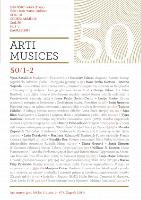
Arti Musices
Connecting Researchers in the Evolving World of MusicArti Musices is a distinguished open-access journal published by the Croatian Musicological Society since 2007, dedicated to advancing the field of musicology and related arts and humanities disciplines. Operating from Zagreb, Croatia, this journal aims to provide a platform for scholarly communication, fostering international dialogue among researchers, musicologists, and practitioners. Although it has a current Scopus ranking in the bottom quartile within its category (Q4 in Music), it offers a unique perspective on the musicological landscape, particularly from a regional standpoint. Researchers seeking to contribute to or glean insights from this evolving field will find that Arti Musices serves an important role in disseminating innovative ideas and empirical research. The journal accepts submissions across a broad spectrum of music-related topics, inviting contributions that reflect the complexities and cultural contexts of music today.
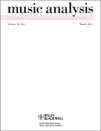
MUSIC ANALYSIS
Advancing the Art of Music ScholarshipMUSIC ANALYSIS, published by WILEY, is a prestigious journal in the field of musicology, recognized for its critical contributions to the analysis of music and its myriad influences on culture and society. With an ISSN of 0262-5245 and an E-ISSN of 1468-2249, this journal has established itself as a vital resource for researchers, professionals, and students alike, boasting a Q1 ranking in the 2023 category of Music. As part of a highly competitive field, it ranks 70th out of 180 in the Arts and Humanities Music category on Scopus, positioning it within the 61st percentile. MUSIC ANALYSIS serves as an essential platform for innovative research and insightful discourse, engaging with musical theory, practice, and education from 1996 to 2024. Its commitment to fostering rigorous scholarship makes it indispensable for those seeking to deepen their understanding of music and its analytical frameworks. Although it does not offer Open Access options, its relevance and impact in the genre ensure accessibility through institutional subscriptions and university libraries.

MUSIKTHEORIE
Bridging Theory and Practice in Music EducationMUSIKTHEORIE is a pivotal journal dedicated to the field of music theory, published by LAABER-VERLAG. With its ISSN 0177-4182, this journal serves as an essential platform for scholars, educators, and practitioners interested in the multifaceted dimensions of music theory. Although it does not currently offer open access, it provides in-depth analyses and critical discourse on theoretical frameworks, compositional techniques, and historical perspectives in music. Despite its coverage in Scopus being discontinued after 2018 and ranking within the 5th percentile of Arts and Humanities - Music, MUSIKTHEORIE remains a respected publication for advancing knowledge and fostering collaboration within the musicological community. Researchers and students alike can benefit from its rich content and the insights shared within its pages.
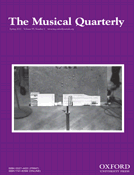
MUSICAL QUARTERLY
Fostering Insights in Music Theory and HistoryMUSICAL QUARTERLY, published by Oxford University Press Inc, is a distinguished journal in the field of music, with a publication history that stretches back to 1915. This esteemed journal, identifiable by its ISSN 0027-4631 and E-ISSN 1741-8399, provides a critical platform for scholarly discourse, analysis, and research in musicology and related disciplines, facilitating an understanding of both historical and contemporary musical practices. Although it operates without open access, it continues to attract a diverse readership of researchers, educators, and students alike, thanks to its well-curated articles and reviews that engage with music theory, history, and ethnomusicology. With a current Scopus rank of #119 out of 180 in the Arts and Humanities category and a 34th percentile ranking in Music, MUSICAL QUARTERLY plays a vital role in advancing knowledge and fostering collaboration within the music academic community. Its commitment to high-quality scholarship is reflected in its ongoing efforts to address the evolving landscape of music studies, making it an essential resource for anyone serious about exploring the rich tapestry of music scholarship.
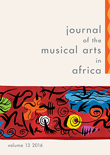
Journal of the Musical Arts in Africa
Embracing Diversity in African MusicologyThe Journal of the Musical Arts in Africa is a premier academic publication dedicated to exploring the rich and diverse musical traditions of the African continent. Published by ROUTLEDGE JOURNALS, TAYLOR & FRANCIS LTD, this journal offers a vital platform for researchers, professionals, and students in the field of musicology. With an ISSN of 1812-1004 and E-ISSN of 2070-626X, the journal has established itself as a significant contributor to the scholarly discourse surrounding African musical practices. With an impact factor reflecting its growing influence, the Journal of the Musical Arts in Africa is categorized in the Q3 quartile of music journals according to the latest metrics, placing it among an essential cadre of publications in the field. The journal invites original research articles, reviews, and critical essays that aim to expand the understanding of music as an integral part of African culture. It has been continuously publishing since 2004 and encompasses a wide range of topics, making it a must-read for anyone interested in the intersections of music, culture, and identity on the African continent. The journal stands as a testament to the vibrant musical heritage of Africa and encourages scholarly contributions that highlight the importance of music in reflecting and shaping societal values.

ACTA MUSICOLOGICA
Advancing Musical Scholarship and DiscourseACTA MUSICOLOGICA, published by the International Musicological Society, stands as a pivotal journal within the field of Musicology, garnering attention from scholars and practitioners alike. With its ISSN 0001-6241, the journal serves as a vital platform for innovative research and discourse from 2002 to 2013 and again from 2016 to 2024, achieving a Q2 ranking in the 2023 Music category. Reflecting a commitment to excellence, it ranks #105 out of 180 in Arts and Humanities Music according to Scopus, placing it at the 41st percentile among its peers. Although not open access, ACTA MUSICOLOGICA ensures the dissemination of significant musical research, fostering scholarly exchange and exploration. This esteemed publication is essential for researchers, professionals, and students looking to deepen their understanding of musicology and contribute to ongoing academic conversations.
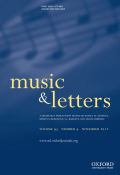
MUSIC & LETTERS
Unveiling the Rich Tapestry of Musical NarrativesMUSIC & LETTERS, published by Oxford University Press, is a prominent academic journal that has been at the forefront of musicology and music studies since its inception in 1920. With an ISSN of 0027-4224 and an E-ISSN of 1477-4631, the journal provides a platform for scholarly articles that explore the rich interplay between music and literature, contributing significantly to the understanding of musical context, form, and societal impact. As of 2023, it holds a respectable Q3 rank in Music within its category, positioned at Rank #66 out of 180 in the Scopus Arts and Humanities Music category. Despite not being an Open Access journal, its rigorous peer-review process and commitment to high-quality research make it an essential resource for researchers, professionals, and students alike. The journal's scope encompasses various genres and historical periods, ensuring a comprehensive examination of music's role in culture and community, thereby enhancing the scholarly discourse within this vibrant field. Based in the United Kingdom, at Great Clarendon St, Oxford OX2 6DP, England, MUSIC & LETTERS continues to inspire and inform the global music scholarly community.

MUSIKFORSCHUNG
Connecting Scholars to the Heart of Music ResearchMUSIKFORSCHUNG is a distinguished journal in the field of music studies, published by NEUWERK-BUCH UND MUSIKALIENHANDLUNG in Germany. With its ISSN 0027-4801, the journal caters to scholars, practitioners, and students interested in the diverse realms of musicology. Although it is currently not an Open Access publication, MUSIKFORSCHUNG plays a vital role in the academic landscape by disseminating research and critical discourse on music from various historical and contemporary perspectives. The journal has established its worth in the academic community, being categorized in the Q4 quartile in Music for 2023 and holding a rank of #169 out of 180 in the Scopus Arts and Humanities Music category, placing it within the 6th percentile. With publication activities spanning from 2002 to 2013 and resuming in 2016 through to 2024, MUSIKFORSCHUNG continues to be a crucial resource for those dedicated to advancing music scholarship. Set in the cultural heart of Kassel, Germany, the journal invites contributions that foster an understanding of music's impact on society and culture.

MUSIK IN BAYERN
Discovering the Rhythms of Bavaria's Past and PresentMUSIK IN BAYERN is a distinguished journal devoted to the study of music within the rich cultural context of Bavaria, published by HANS SCHNEIDER. With the ISSN 0937-583X, this publication serves as an essential resource for researchers, professionals, and students interested in the historical and contemporary musical landscape of the region. Spanning topics from traditional Bavarian folk music to modern interpretations, the journal aims to foster a deeper understanding and appreciation of Bavarian music in a global context. Although the journal's coverage in Scopus has been discontinued, it remains an essential platform for scholarly communication and analysis in music studies. While MUSIK IN BAYERN operates under a subscription model, it continues to hold significance as an intellectual resource for advancing research in musicology.

Problemy Muzykalnoi Nauki-Music Scholarship
Connecting Scholars Through the Art of MusicWelcome to Problemy Muzykalnoi Nauki-Music Scholarship, a leading journal in the field of music scholarship published by the esteemed Gnesin Russian Academy of Music. With an ISSN of 2782-358X and an E-ISSN of 2782-3598, this Open Access journal has been committed to the dissemination of high-quality research since 2009, making scholarly work accessible to a global audience. Covering diverse aspects of music theory, history, and its socio-cultural impacts, Problemy Muzykalnoi Nauki serves as an essential platform for scholars, educators, and practitioners in the arts and humanities, as well as in social sciences related to music education. While its Scopus coverage was discontinued in 2021, the journal remains influential, holding a rank of #48 in the Arts and Humanities category and a percentile of 67th, showcasing its relevance and rigor in the discipline. We invite researchers and students alike to explore the rich contributions made within these pages, fostering a deeper understanding and appreciation of music in contemporary society.